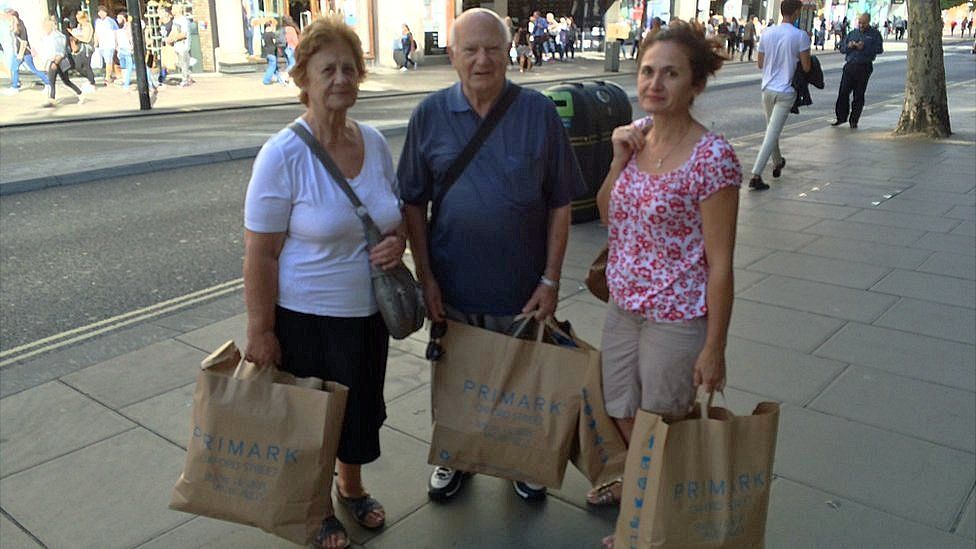Will Brexit be a boon for tourists?
- Published

It's official. Tourists love coming to the UK.
Overseas residents made a whopping 3.8 million visits to the UK in July, up 2% on the same month last year, according to the most recent official statistics. In total, they spent some £2.5bn.
This was the first month after the Brexit vote, suggesting its outcome, so far at least, has had little impact on visitors' enthusiasm for the UK.
But will this interest continue?
Central London seemed like a good place to try and find out.
Tumbling pound
Joseph and Winifreda Cassai, and Jackie Douglas, all from Malta, were cheerfully laden with Primark bags on an Oxford Street bathed in September sunshine when they agreed to talk to the BBC.
So why did they come to the UK? Jackie says: "The pound is attractive."
Winifreda adds: "That's why we came - but the hotels are too expensive."
They love Primark because they don't have the fashion-chain in Malta, they say.
They are not alone in splashing the cash after the Brexit vote.
According to FTSE 100-listed payments processor Worldpay, there was a big increase in UK retail spending growth on foreign cards after the referendum.
In all, foreign card spending growth was up 3.4% in August compared with the previous year, and online sales growth rose by 5.3%. High Street sales were up 3.0%.
After the 23 June referendum, the pound fell, tumbling from $1.47 just before the vote to $1.28 by mid-August, meaning many tourists could afford to buy more.
On Oxford Street, Chrissie Aspinall, from Cairns in Australia, and Indi Shields, from nearby Mission Beach, both said they had noticed a major boost in the spending power of their Australian dollars.
Both had suffered luggage misfortunes in their travels, and had their hands forced by having to buy new clothes - but said the pound's slump had made this easier.
Like the Cassais from Malta, they found accommodation too expensive, and were "couch-surfing" online or staying with friends.
Despite the difficulties with accommodation, Indi had managed to find some spare cash. She decided to buy new shoes after going dancing in Shoreditch, a very trendy part of London.
"I came here in Birkenstocks [sandals] and everyone here wears closed-in shoes. I was on the dance floor and I got booed off. Not good."
Footwear seemed to hold a certain fascination for Vivien Hang, Josh Tok, and Aaron Lee from Singapore, too.
For them, the weaker pound has also been a factor in their decision to come to the UK.
"It's cheaper to shop here now because of the exchange rate," says Vivien. "It gives us an excuse to shop… I used to study here. I like the people here, and the culture."
Josh adds: "But not the weather."
They don't normally go shopping in the UK, but Josh and Aaron had decided to splash out on some shoes.
Aaron says: "In a way the currency helped a lot... in general the prices here are higher [than Singapore] so when the pound drops, it helps a lot."
So for the short term, the signs for British tourism look good.
Industry body, the Tourism Alliance, says that in July advance bookings from foreign tourists increased for 18% of businesses, while 21% of firms said domestic tourist bookings had increased.
But there are two big question marks hanging over UK tourism, it says.
Around 76% of trips made by UK residents are to EU destinations, while 67% of visitors to the UK come from the EU.
EU tourists are worth £10bn each year to the UK economy, and that spending supports 185,000 jobs.
"The reason that the UK receives such a high level of tourism from European counties is not just that they are wealthy nations located on our back door," says its director Kurt Janson.
"It's because over the last 40 years there has been an army of officials in Brussels working on agreements, regulations and rules that help facilitate the ability of EU citizens to cross national borders."
There are also arrangements such as the Single Aviation Market, which gives UK carriers rights to fly between EU airports.
"Any deal that makes it harder for businesses to operate across the border, or for people to travel across the border, will trigger a fall in tourism," Mr Janson says.
The UK's tourist sector is also very dependent on workers from the EU.
"To grow and be able to provide high quality service, the UK tourism industry needs there to be free movement of workers between the EU and the UK.
"This may not be popular with some of those that voted to leave, but is essential to the viability of the UK tourism industry," Mr Janson adds.
- Published22 August 2016
- Published8 August 2016